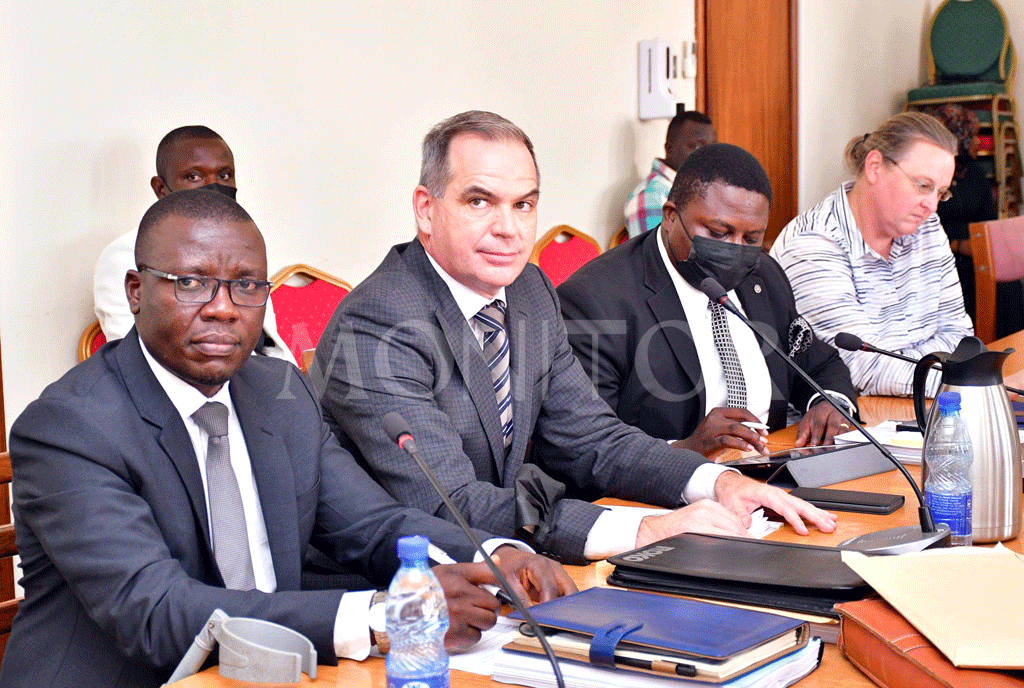MPs quiz Roko over Shs202b govt share deal

Left-Right: Roko Construction transaction adviser Joseph Kibuuka, managing director Mark Koehler, legal counsel Paul Jacob Batte and director Brigitte Koehler before Parliament’s Finance Committee at Parliament on July 12, 2022. PHOTO/DAVID LUBOWA
What you need to know:
- Roko has faced financial challenges in the construction market in recent years following the death of its founder, Rainer Koehler, in 2013.
Roko Construction Limited yesterday explained the government’s intended plan to acquire 150,000 preference shares worth Shs202b from its company and the likely benefits.
During a meeting with Parliament’s Finance Committee, a team from Roko led by their managing director, Mr Mark Koehler, gave justification why the government should invest in their company.
“The company is a major player in the construction industry and one of the largest taxpayers [in the country],” Mr Koehler said.
According to data that Roko presented before the Committee, the company has on average been paying approximately about Shs15 billion in taxes, as well as contributing Shs1.5 billion in pension contributions per year.
More reason
Roko also explained the role of the State in facilitating development through wholly or jointly investing with the private sector and supporting its development through provision of affordable financing for production and business.
Roko has faced financial challenges in the construction market in recent years following the death of its founder, Rainer Koehler, in 2013.
Giving further justification for the bail out, the company said it needed to execute current projects successfully and reduce the cost of funding that it is currently experiencing.
Among some of the successful projects Mr Koehler listed to have been completed by the company include Workers House, Crested Towers, Rwenzori Courts and Towers, and Imperial Mall Entebbe, among others.
Mr Joseph Kibuuka, a transactional advisor at Roko, highlighted that there was more need to support the private sector, particularly small businesses to develop capacity to drive industrialisation effort, increase exports and local content, as well as create more jobs.
Also, Mr Kibuuka added, Roko has obligations to financial institutions and creditors that are important to the much needed economic recovery amounting to Shs202 billion.
Despite the reasons highlighted by the Roko team, this did not stop members from the Committee from questioning them further about the matter.
“Why is Roko in such a financial crisis given that the company has been making profits? And, why are they looking for an investor?” I am more puzzled why you need more money yet you [claim] to have been performing well? Mr Karim Masaba (Mbale Industrial Division), wondered.
Mr Kibuuka said Roko had partly been subjected to a lot of penalty interests for none payment due to delayed arrears.
“So the company could not meet its obligation to the banks and they began to charge interest on interest, which ballooned from 2019,” he said.
Mr Muhammad Muwanga Kivumbi (Butambala County), who also serves as the shadow minister of Finance, asked what governance challenges the company was facing and whether some of these had been addressed.
To this, the Roko team could not elaborately give the desired responses and instead preferred to avail a written document at a later date to the Committee.
On some of the questions that went unanswered during the session, Mr Keefa Kiwanuka, the Committee chairperson, resolved they would get in touch [in the near future] with the Roko team to provide other answers.
Roko’s interface comes after Ms Anita Among, the Speaker of Parliament, last week referred the government’s proposal to the Committee for scrutiny before reporting back to the House in one week with a report that will be debated by the legislators.



